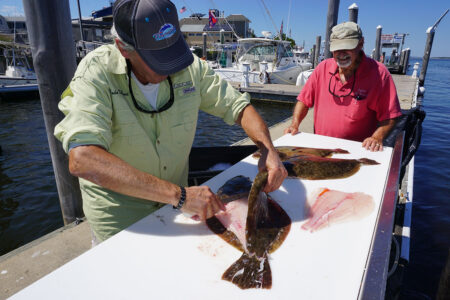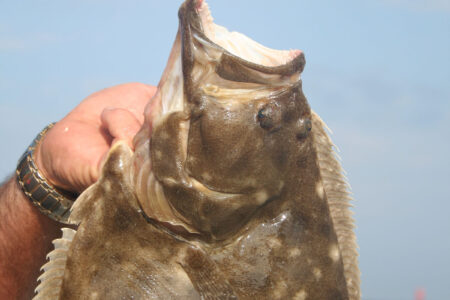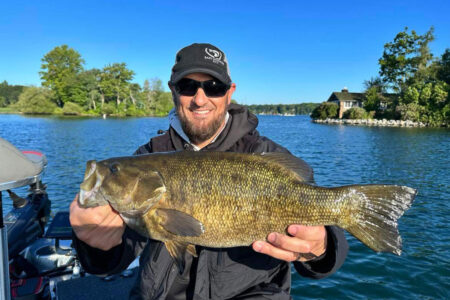A successful ‘first fishing trip’ will go a long way when introducing your child to the sport you love.
What’s your earliest memory of going fishing? Was it a cool crisp spring morning, the rising sun burning the morning dew off the grass, birds chirping, the line flying effortlessly off the reel, with a solid pick of quality fish all morning? Or was it like the rest of us? A stressful tangled mess of unmet expectations that ended abruptly. It’s a common sight to see on opening day; an adult untangling one rod while yelling “STOP REELING IT IN, IT’S TANGLED!” If you want to get your little one into the fishing game but you’re feeling apprehensive about ensuring it’s a success, don’t worry, I’ve got you covered!
When taking your child fishing for the first time, it’s best to find a spot with easy access and close parking, that you know was either recently stocked or has fish that you know will be willing to eat. This is not the time to attempt to instill match the hatch skills during an isonychia hatch in a heavy flowing river an hour’s drive from your front door. Nor is it the time to take your son or daughter on an overnight trip to the canyons for deep drop swordfish. Your son or daughter does not care how many lures you have, how many world records you hold, how far you can shadow cast your Lami, or if you have never even gone fishing in your life. Your son or daughter definitely does not care how good of a fisherman you are, in fact you can be the worst fisherman in the world and still be a fishing hero in their eyes. The important thing to remember is to leave your pride at home and look at this as an experience for your child to help get them addicted to the outdoors and fishing.
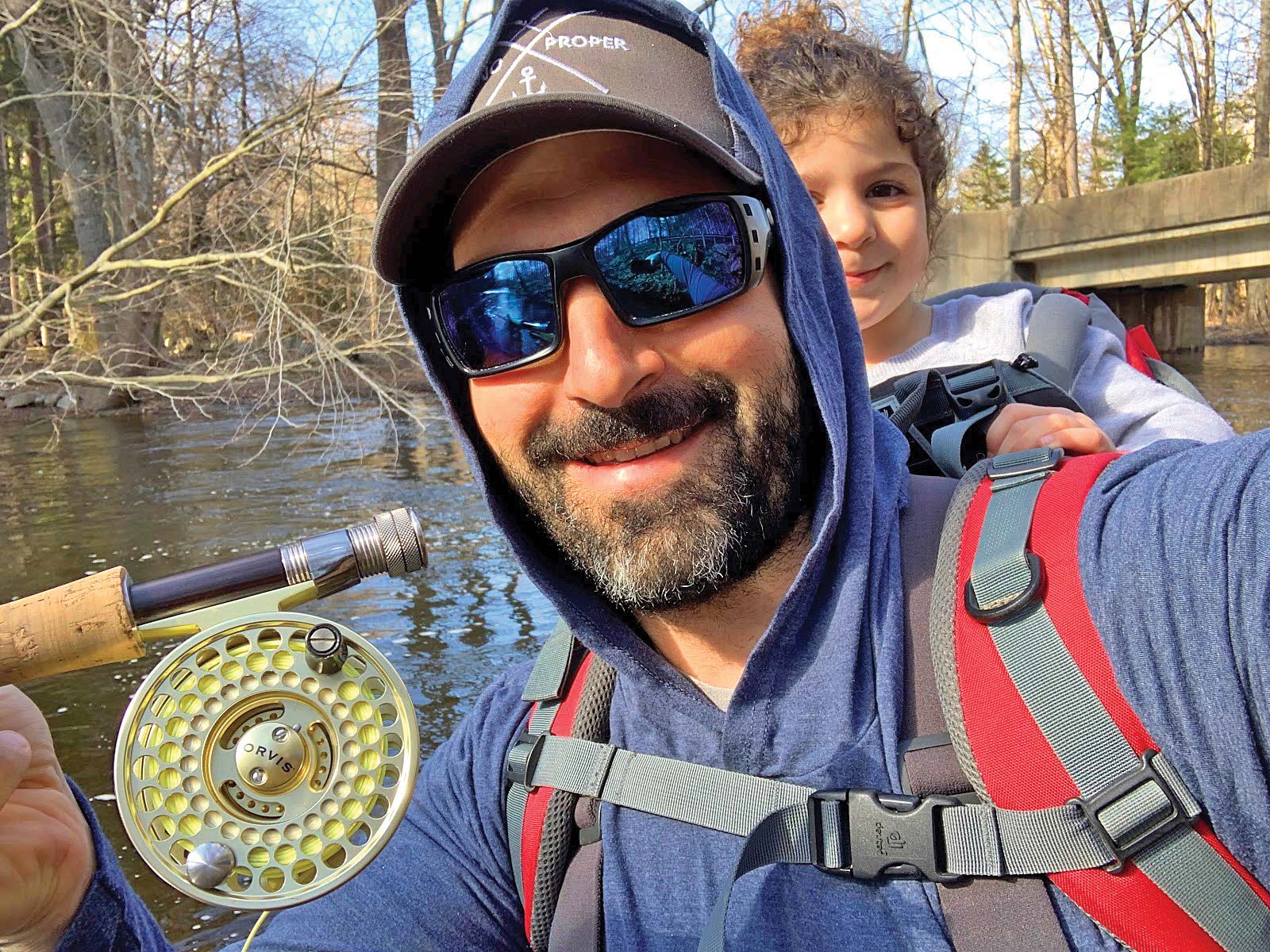
Easy Targets
Refer to stocking reports posted by your local fisheries department, or better yet go see your local tackle shop and ask them where to go. You may find out that there is a kids fishing derby coming up, where they normally release many hungry stockies (which is likely to ensure a successful first fishing experience). If saltwater fishing is your thing, wait for summer and when the porgies start to fill inshore waters, grab some sandworms or clams and give it a shot. Perhaps targeting snappers (juvenile bluefish) with a snapper popper is more your thing. Again, advice from your local tackle shop will help point you in the right direction.
Stay Close To Home
Depending on the age of your child, by staying close to home it will afford you the opportunity to abort with no serious regrets. If the fishing is subpar, or your son or daughter is having a bad day, then it’s no big deal to just pack up and go home before they really lose interest and it turns into a bad day. If you do not live close to any body of water, find a playground online or a good ice cream spot to take your child once fishing is over. Limit your fishing time to one or two hours at most (depending on the age of your child and their attention span).
Snacks, Snacks, Snacks
The title says it all! Snacks are such a life saver! As an adult we may not think of snacks as part of our daily routine, however for little kids, snacks are key. Kids get hungry, and when they are hungry they get HANGRY! Granola bars, Goldfish crackers, juice boxes, and good old peanut butter and jelly sandwiches are a go-to in my house. Don’t forget to pack hand wipes for cleanup. Speaking of cleaning up; be sure to set the right example by picking up your trash!
Teach Conservation
If you do end up catching some fish, it is a great opportunity to showcase good sportsmanship and conservation skills. The first step in making this happen is knowing the regulations for the time of year and location you will be fishing. Refer to your local fisheries service website or printed abstracts for details on local regs and seasons. Having a set of needle nose pliers or forceps is a life saver when trying to unhook that fish you have been waiting all day to catch. The last thing you want to ingrain in your child’s mind is how you had to rip out the fish’s guts in order to get your hook back. If need be, just cut the line as close as possible to the hook.
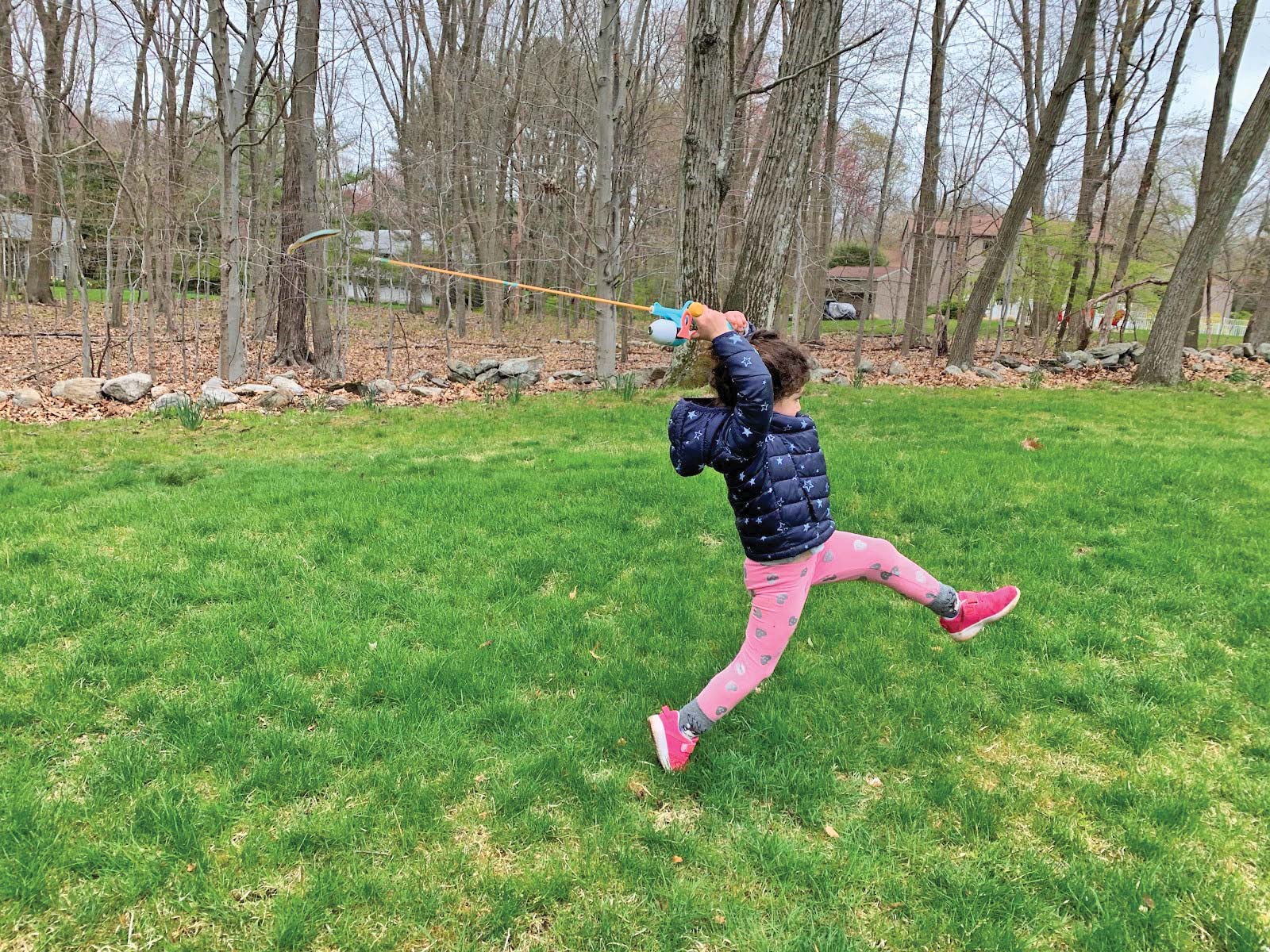
Go Barbless
By pinching the barb down on any hook with a forceps or pliers, you will greatly reduce the chances of accidentally killing a fish. Another reason to go barbless is kids are typically not the best casters and if little Johnny or Suzie is not watching their backcast, and they end up hooking you, or themselves, removing the hook will be much easier. It may even save you a trip to the ER, and save you from the task of having to explain this to you spouse.
No Expectations
When we choose to take our kids fishing, of course, we hope to catch a few fish, otherwise we would have taken them for a hike, or for a bike ride. However when there is too much emphasis put on the act of actually catching and landing a fish, the expectations are set too high and the pressure will weigh heavy on your mind and wear away the patience of you and your child, resulting in lost interest, and hurt feelings. It’s okay if your fishing day turns into a rock skipping day. It’s ok if your child is more interested in the bugs under the rocks. It’s ok that they just want to eat snacks and not fish at all. Remember, it’s about you spending time together. If the first experience of fishing with your kids results in a bad day in their eyes, you may have a more difficult time convincing them to go with you the next time. You most certainly need to be patient when trying to take your kids fishing. Try to plan it on a day when you don’t have much planned so that you don’t feel rushed.
It’s Ok To Leave Them Biting (This Time)
Let’s say you are fortunate enough to have a banner day fishing. You are hauling the fish in left and right, it’s the best bite of this century, but your child had enough. Then, in this case, as hard as it may be, you have to pull the plug and leave the fish biting. Do not try to stretch out your fishing time too thin. It is better to walk away with a few fish caught and a happy kid versus a screaming one.
Equipment
I subscribe to the KISS Method, when choosing equipment to take with me fishing. Usually I just take a small Plano tackle storage box, no bigger than what I can fit in my pocket or small bag. In it I usually have five or six lures, an assortment of hooks, a few small bobbers, and split-shot. I usually stuff a jar of Powerbait or a small container of worms in my other pocket and we are good to go. If I am fly fishing, I just take a small fly box that I can fit in a pocket, and one small roll of tippet material. I usually clip my forceps together with a nail clipper and I attach that to my jacket or shirt. My thought on keeping it simple is if there is a chance that you may have to carry your child, you definitely do not want to also carry one to two fishing rods and a huge tackle box as well. You likely won’t be fishing long enough to go through all of that tackle listed above, so less is definitely more in this scenario.
Depending on the age of your child, a backpack carrier may be a life saver. If there is a little bit of walking or wading involved, popping your child in the backpack is perfect because you are doing all the work, while they get to hang out and eat snacks, and watch while you fish. If your little one isn’t so little, this is not an option.
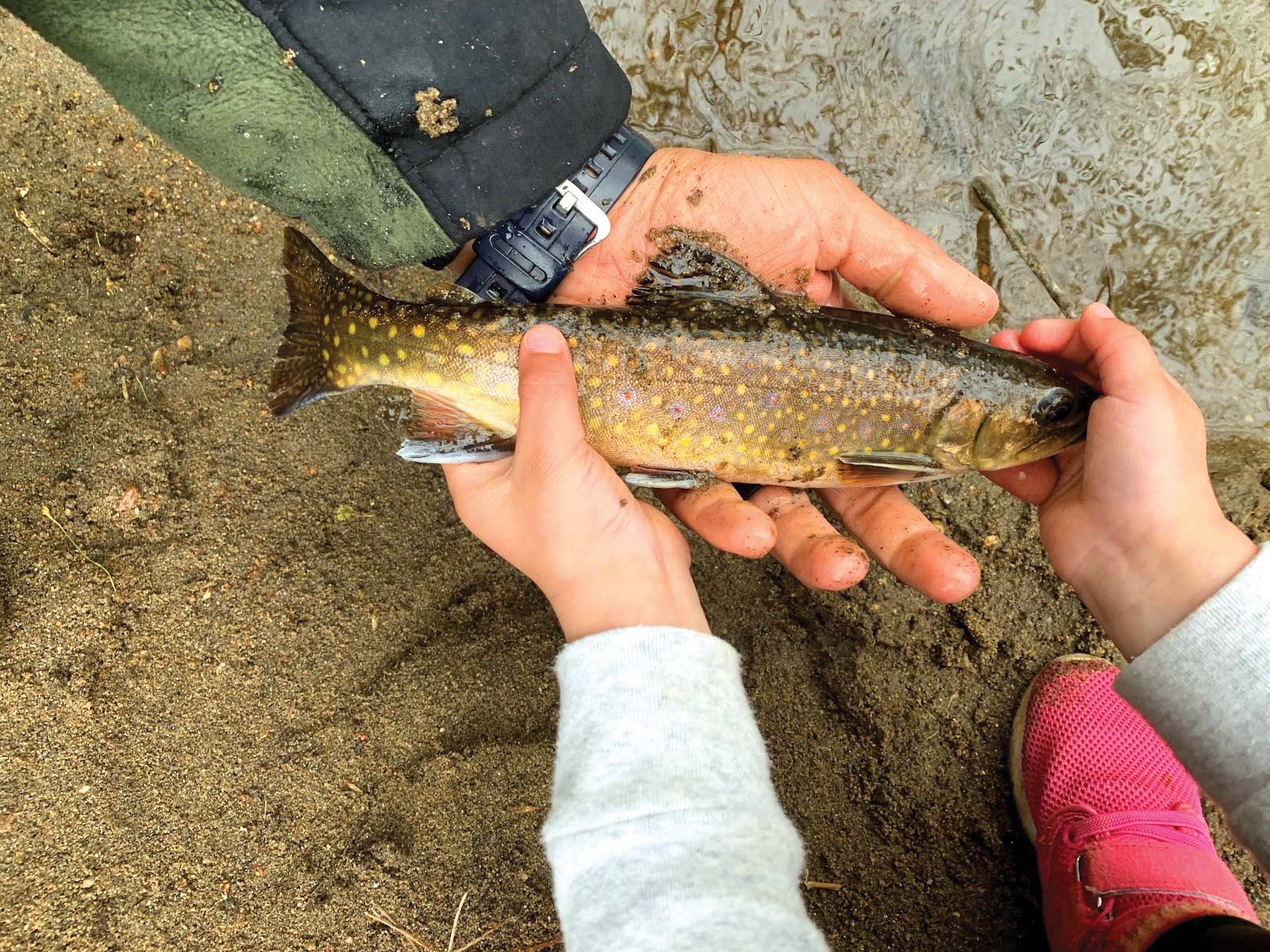
Practice Casting
I have kind of made it a regular occurrence to offer “pretend fishing in the grass” as a normal alternative activity of sorts, as opposed to just playing in the yard. We break out the Moana rod and I tie on a small jighead (with the hook broken off just after the bait keeper). Upon my daughter’s request I add on a hot pink Slug-Go and off we go. Teaching her how to actually use the push button feature of the Moana rod has definitely been the most challenging part of this process for me. She has definitely gotten frustrated along the way, and some days she is pretty darn good at it. Other days it’s as if she has never even seen that rod before, let alone ever held it and tried casting it. Once I sense her getting frustrated I usually stop instructing, and let her do her thing. Or we just call it a day.
When waking your child up early, and dragging them out of their bed away from a world that favors electronics, screentime, and WiFi, be sure to reassure yourself that it will all be worth it. You will be providing something to them that is way more valuable than the instant gratification that comes along with pressing a button and getting the reward from a video game or turning on the TV. You may not know it, but you are helping to develop a set of life skills that will help them in the long run. By taking your child in the woods or to a fishing hole, you are introducing them to unstructured play time that is so lacking in today’s world where they have to create their own entertainment. For most of our kids their day is determined by tight schedules (time to wake up, time to go to school, time to go to baseball practice, time to do your homework, time to eat dinner, time to go to bed), helicopter parents, and structured supervised playtime. Your day alone together is whole heartedly worth waking up early, money spent on tackle, and frustration you may experience.
Your kids will thank you for it later.
